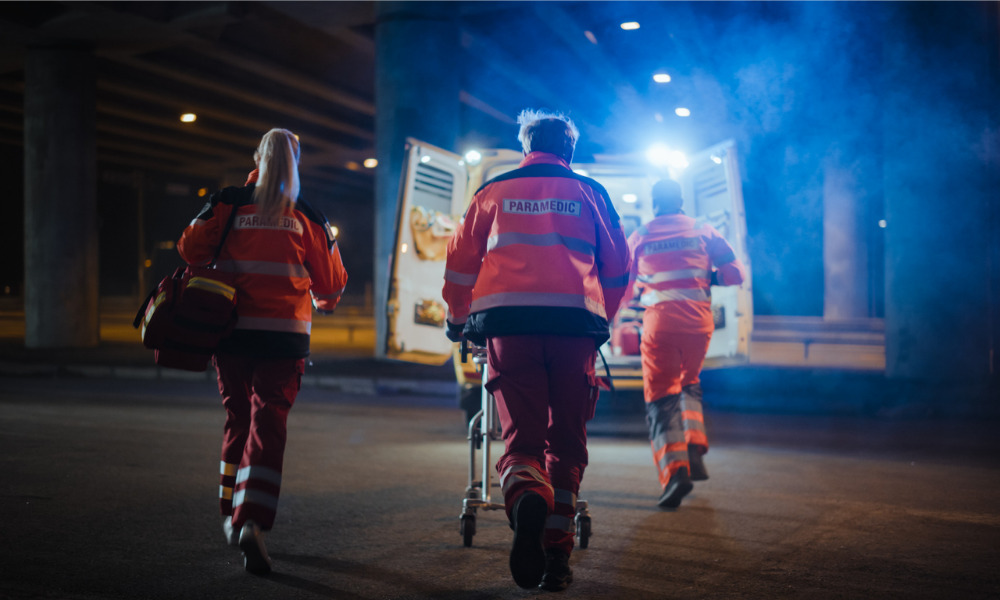Understaffed profession plagued by mental health issues caused by fatigue and burnout

The plight of paramedics in Ontario “has escalated to the max” according to the health and safety representative for the CUPE Ambulance Committee of Ontario, Ian Nash.
He describes a profession plagued by fatigue, burnout, and a chronic understaffing. It’s causing mental and physical safety problems for the people who help all of us during the most dire of circumstances.
Nash paints a picture of a paramedic who entered the workforce at the age of 20 and has spent the past 30 years treating, lifting, and transporting patients who are experiencing some kind of trauma, which the paramedic shares in.
“The mental health issues that arise in your career, and what we see on a day-to-day basis, and what we have to deal with is very detrimental,” to both mental and physical wellbeing, says Nash.
According to 2016 to 2022 data from the Workplace Safety and Insurance Board, paramedics are listed among the occupations with multiple (more than 1) suicide claims.
Hospital backup
Here’s a situation that has become far too common for Nash and the other members of the EMS Section 21 sub-committee created back in 2007. A paramedic picks up a patient and transports them to the hospital, but instead of dropping them off and heading out to the next urgent 911 call, they are forced to wait with the patient in the emergency room, or sometimes inside the ambulance, because a bed isn’t available. A doctor or nurse isn’t available.
“There’s a backup,” explains Nash, who says sometimes there could be “12 to 15 ambulances waiting to unload.”
“That's hard for a paramedic because when we go to school and do our training, we are trained to do calls. That is our job. And we know people are sick, they need us, and we cannot get to them.”
Nash challenges anyone to imagine the mental and emotional impact a scenario like that might have. Now imagine it happens every day, sometimes multiple times a day.
Burnt out
“We're having a serious staffing shortage,” says Nash, and this is not just an anomaly to Ontario, it's national.” Many provinces are experiencing paramedic fatigue. They often work long shifts, and are forced to work overtime, because there isn’t enough staff to cover the shifts.
“We don't have enough paramedics on the road and COVID kind of exasperated everything. The amount of calls we're doing has gone up. And mental health is at the forefront.”
Nash says they are working to secure funding to provide access to mental health services to paramedics across the province.
Recruitment struggles
Aside from paramedics taking time off work to manage their own health, Nash says the issues around understaffing stem from recruitment, which he says has been a struggle dating back more than 20 years.
“The colleges are not attracting enough people to come into the profession,” says Nash, who believes staffing problems will only get worse as a wave of older paramedics get set to retire.
“We definitely need more resources. We need to attract more people to come into the programs,” and Nash says they need to retain them after entering the profession.
Committee upgrade
Faced with a plethora of problems, the province of Ontario has enhanced the EMS Section 21 sub-committee to become a stand-alone Paramedics Services Committee under the Occupational Health and Safety Act.
It means Nash and his colleagues, both in management and within the unions, will be in a stronger position to lobby the government for desperately needed resources.
“This is a more direct line to the minister,” explains Nash, who says they will develop guidance notes, make recommendations, and develop resources to tackle the health and safety issues facing paramedics.
“These everyday heroes work tirelessly to bring us the medical attention we need, and in return, they deserve to get home safe too,” says Monte McNaughton, Minister of Labour, Immigration, Training and Skills Development in a press release.
The creation of the stand-alone committee is being applauded. But it won’t mean anything unless the minister (and his successors) listen and act.





